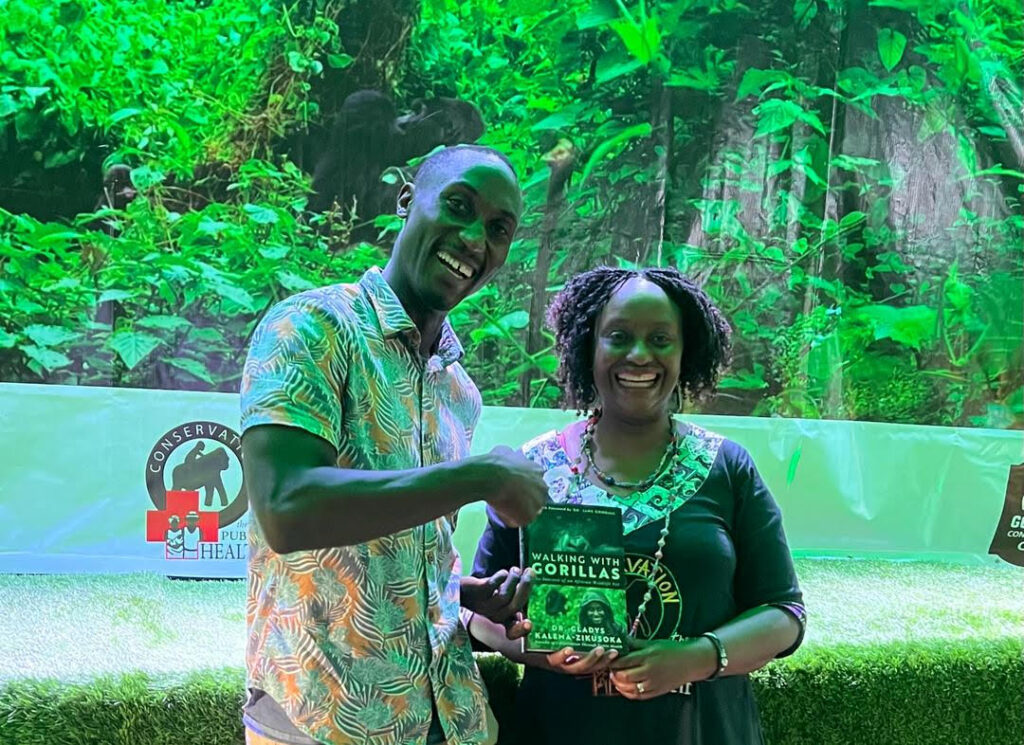By Daudi Mutalya Balye – Chief Exploring Officer Buutu Safaris

Our Chief Exploring Officer Daudi Mutalya Balye had the good fortune of catching up with Dr Gladys Zikusoka-Kalema at the launch of her groundbreaking book – Walking With Gorillas. The book details the remarkable journey undertaken by Uganda’s first wildlife vet and the great work of the men and women of Uganda in the conservation of Uganda’s rich biodiversity. We spoke and posed pertinent questions to her for insights of one of Uganda’s leading thinkers and conservationists.
Daudi Mutalya (Buutu Safaris): Congratulations on the monumental book “Walking with the Gorillas”. It was impossible to put the book down when I started reading. I hope more people will read the book and that the book will inspire young and old for generations to come. Thank you for taking the lead in writing a good African story. Gorilla conservation in Uganda has been a tremendous success. How can we scale up this successful conservation model?
Dr Zikusooka Kalema: Yes. I think the success is down to the fact that when Bwindi Impenetrable National Park (BINP) was created, conservation had changed from keeping people out and wildlife in, to engaging communities in conservation. And so that is the main reason gorilla conservation has been a success story. Most of the people from the area were employed by the park. The park focused on employing people from the area around the park. 20% of the park entry fees goes to the communities and 10 dollars from every permit goes to the communities. All this really helped.
And, the entrepreneurs, the porters have all been supported. The porters are some of the wealthiest in the community. The whole industry has developed around gorillas. The schools and the clinics were supported. It supported the entire economy and turned it around. So people were more willing to protect gorillas because they knew there was a future.
Local involvement, increased revenue sharing and improved veterinary care. All gorillas which fall sick will have someone attending to them. And also improving community health because when people are healthy, they will not make the gorillas sick, and that’s what we focus on in Conservation Through Public Health. The revenue sharing can improve but it is better than in most places.
Daudi Mutalya BTS: The success of gorilla conservation has led to more gorillas. We can assume the continued success of gorilla conservation is going to further increase the number of gorillas so how do we then increase the space for gorilla habitat?
I think we can increase the space for the gorillas by expanding the park. We have no choice. Rwanda has already started doing it. Uganda has to do it. We have to expand the park by convincing people to sell their land. We can’t run away from it. And they have already started selling to tour operators.
Which I feel is not very good because the gorillas will be locked in by the lodges. Some areas like where there is that narrow neck is a key area. We need land for the gorillas themselves.
I know some lodges do put aside land but others just put buildings.
Daudi Mutalya BTS: We have a rich traditional heritage and yet a huge part has been lost in times of modernity. You have a rich Buganda traditional background. How do we reclaim some of the lost traditional conservation practices that were at the core of conservation?
Through conservation education.
Documenting everything is key to preserving our traditional heritage. We are not very good at doing things as Africans. We are good at talking but not writing.
Engaging the cultural institutions, our ancestors for example the Buganda, Tooro kingdom or whichever kingdom. They all have clan leaders and people with this traditional knowledge. Our ancestors and clan leaders, all that is very important. We need to tap it before it disappears.
When we were celebrating 10 years of UWEC we got the Nabagereka (The Queen of Buganda) to help. In fact, I write about it in the book.
Buutu Safaris: How do we get conservation outside the park to a more traditional way where conservation remains at the centre of our society?
We need to engage the kingdoms and work closely with the clan leaders. I am so glad that Prince Wassajja was here. We need to revitalise that – working closely with the clan leaders.
Thank you so much once again. All the best with the book tour.
We excel at creating unique gorilla trekking and big game encounters in the African wilderness